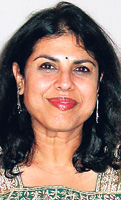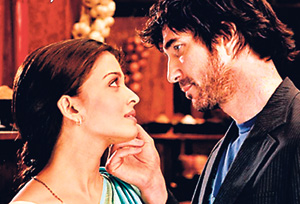Jiang’s tale begins with the line: ‘When I was a child, I lived inside a secret.’ Against the backdrop of the Sino-Indian war of 1962, the resourceful Chinese woman finds love only to lose it. Jiang’s story is the first in a set of nine linked tales that make up Chitra Banerjee Divakaruni’s newest novel, ‘One Amazing Thing.’
The best- selling Indian author’s much anticipated novel revolves around a group of visa applicants, trapped in an Indian visa office after an earthquake strikes an anonymous American city. In a twist on the Canterbury Tales’ format, they decide to share with each other one amazing story. As water leaks into the room, and a ruptured gas pipe threatens to deprive them of oxygen, Chitra’s characters cling to life and to hope. Each is propelled into raw vulnerability by these extenuating circumstances, and the author leaps across time and place, straddling ethnicity and background to lay bare each human heart.
 |
| Chitra Banerjee Divakaruni. |
“I knew I would be working with a very limited, claustrophobic space, and I had to find a way to open that up for the reader,” Chitra explained in an email interview with the Sunday Times.
Giving each of the nine equally important protagonists their own unique voice was a challenge, she says adding, “the stories the characters tell each other as they wait - for rescue or for death, they aren’t sure which - take the reader into different times and worlds, and also give them different voices to listen to.”
Using the ploy of a visa office to bring together people of diverse nationalities, Chitra turns out a great multicultural novel, and this focus is characteristic of the author. If she has a niche, it’s as a writer chronicling the modern immigrant experience. Chitra brings to her fiction a rare sensitivity and an extraordinary lyricism, but her approach to her art betrays her Indian origins.
As with many of the old stories told in that land, the gritty realism of her tale is almost always edged with a deep mysticism, where gods and demons lurk, and where Fate holds sway. But Chitra’s books are as much about personal choice.
From Anju and Sudha in ‘Sister of My Heart’ to Panchaali in ‘Palace of Illusions’ her characters earn your admiration and wring your heart. It’s a blend that has won Chitra both critical and popular acclaim. Yet, over the course of 15 books, her motivation has remained clear – her books are a bridge of words, an attempt to take a reader to understand both themselves and those they might have labelled ‘other.’
Much of her determination stems from Chitra’s own experience as an immigrant. “I always loved reading or listening to stories, but immigration is really what made me into a writer,” she says. As a 19-year-old, Chitra left her home in India to study in the U.S. “It was a profound experience for me, brought up in a strict, traditional Bengali household in Kolkata,” she says, looking back.
Like many immigrants, Chitra struggled to make ends meet. Envisioning a future as a professor of English literature, she paid for her education with an assortment of odd jobs. She worked as a babysitter, sold merchandise in an Indian boutique, sliced bread in a bakery, washed instruments in a science lab, cleaned dishes and sliced Jell-O. In the process she met other travellers, and realised she was compelled to tell their stories. “It (immigration) made me rethink my place in society. Speaking to other South Asian women, I got the sense that I was not alone. Immigration was changing us in ways we had not imagined when we left our motherlands.”
 |
 |
Her first publication, a collection of short stories titled Arranged Marriage (1995) won her critical acclaim and examined the lives of immigrant women. (She has said that some of her short stories were inspired by the women she met as one of the founding members of MAITRI, an organisation in the Bay Area of California that, among other things, offers support to South Asian victims of domestic violence). The bleak overtones of that collection would eventually give way to the more joyous fantasy of the award winning ‘Mistress of Spices’ (1997).
The book is Chitra’s best known work (it was even made into a rather mediocre film starring Aishwarya Rai) and is studied in campuses all across the world. “I wanted to balance prose and poetry, to juxtapose the magic of the folktales I had grown up with against the gritty background of inner-city challenges,” she says of the book.
Chitra has an enduring love for a good folktale, a remnant of a childhood spent listening spellbound to her mother and grandfather, both enthusiastic storytellers. “In the worlds of these tales, the realistic and the magical go hand in hand. I believe that beyond the logical world of the senses, there exist other worlds. I’m always searching for them,” she says. Many of her characters share in her quest, none more so than Tilo, who is herself a magic being and a mistress of spices.
Her other books have stretched her in their own ways. “In ‘Sister of My Heart’, I needed two protagonists, each equally interesting. In ‘Queen of Dreams’, I wanted to show the changed reality, for South Asians, of post- 9-11 America,” says the author. But it is perhaps ‘Palace of Illusions’ (2008) that represents her greatest accomplishment.
It is the story of India’s great epic – the Mahabharat - retold from the perspective of Panchaali, wife to the five Pandava brothers. Born of fire, Panchaali is the handmaiden of a cruel fate and the woman who is in part responsible for kurukshethra – a war of apocalyptic proportions. Condensing the sprawling Mahabharat into approximately 360 pages, Chitra turned out what might be her finest work to date. It took four years to research and write ‘Palace of Illusions’, says the author, adding that she also struggled to get Panchaali’s voice just right. “I wanted to keep her authenticity, but I also wanted to make her timeless, someone that women (and men!) of today could relate to.”
Panchaali, headstrong and beautiful, appears only briefly in the Mahabharat, notably at the time of her wedding where she chooses a disguised Arjun from among a host of other suitors, and then again when she is humiliated in Duryodhan’s court after Yudhishthir gambles away his wife’s freedom. But her bloodthirsty vow and determination to see her honour avenged make her one of the most memorable characters in the original epic. With Panchaali for her narrator, Chitra needed all her ingenuity to write her novel. “It was very challenging to do what I’d decided on: to keep all the major events as they were in the original, and work on re-presenting/ re-deciphering/imagining Panchaali’s inner feelings, thoughts and motives,” she says.
Writing is an intense process for Chitra. Her “three men” – to whom so many of her books are dedicated - “put up with minimal dinners and a messy house” when she’s in the middle of a book. Her sons, one aged 15, the other 18, have in turn grown up on her stories. She wrote the Brotherhood of the Conch trilogy - The Conch Bearer (2003), The Mirror of Fire and Dreaming (2005), and Shadowland (2009) – for them.
 |
| ‘The not-so-successful film version of Mistress of Spices, starring Aishwarya Rai |
There was another reason Chitra decided to write for children. She goes into detail on her blog http://www.chitradivakaruni.com/blog/, discussing what must have been a painful brush with racism. Chitra is wonderfully accessible to her fans – on her website she dispenses information and recipes, and shares her thoughts with readers. She is also pleased with her facebook page - http://www.facebook.com/chitradivakaruni. She relishes the encounters that result: “I hear from readers from all over the world - from places I had no idea that people ever read me there.”
Though it absorbs much of her time, writing is only one part of Chitra’s life. Her other great passion is teaching – she is currently teaching at the University of Houston’s Creative Writing Programme. “My daily life is quiet and simple - on purpose, to leave me time and energy for the things that are important - my teaching, my writing, my spiritual practices, my family (which includes our golden retriever), my activist work in the fields of literacy and domestic violence.”
India, the land from which her characters flee and to where they long to return; the homeland which they alternately celebrate or despise, is a place she loves to visit. “I hope once my second son is in college I will get a chance to go and live there for a longer period,” says Chitra. In the meantime she is resolved to keep writing novels. “I’m very enamoured of the novel form - I feel I have so much to learn. There’s a whole world to create, many balls to keep in the air at the same time,” she says enthusiastically, “it’s like creating a huge tapestry...” |
